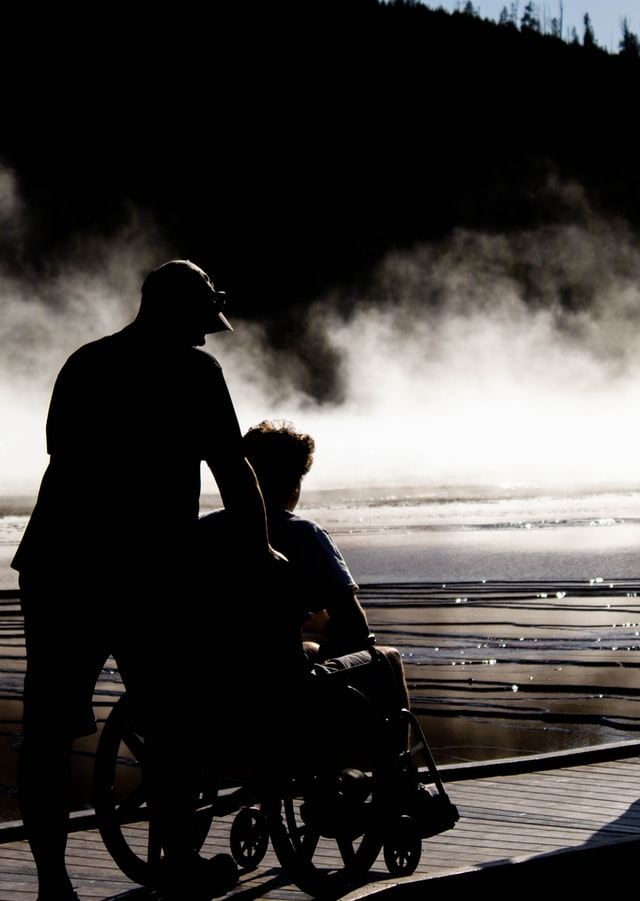Travelling with disabilities is a far cry from the care-free exploring I was able to do as a younger person. There is no doing star jumps on the beach like you see in the adverts (obviously); or setting off at the last minute because of a special offer; or simply because you feel the urge. Even though I am fortunate to have only the mildest of disabilities, any form of travel feels more like organising military manoeuvres than taking a break.

That said, my thirst to see all the world has to offer has not abated. My dream of spending time on a lake in Sweden has yet to be fulfilled and, with both children Stateside, a few more trips there are inevitable. Those of you who read my last blog know that we had a brilliant visit to the Highlands. We saw and experienced so much and truly cherished the kindness and hospitality we were given. However, I realised that it was a Facebook edition and didn’t really tell the whole story. Within that wonderful holiday were endless frustrations and hurdles to be crossed and for the sake of honesty, I would like to clarify that here.
The best laid plans
If you are planning to travel with any mobility issues or other health concerns, being prepared is absolutely mandatory. We booked our hotel months before we left and established that our room was on the ground floor and had a walk-in shower. Though I can manage stairs, I can’t do it too often and getting into a regular bath is absolutely beyond me.
Our hotel in the Highlands was fine, but it did have some stairs (to my ground floor room!) and lots of little steps to make life interesting. One of the modern hotels we booked without checking, however, had a giant flight of stairs and no lift. Arriving exhausted after a long journey, it took all my energy to haul myself up them and I certainly wasn’t going to tackle them again until I descended for breakfast and stayed downstairs, the next day. It also had the most slippery shower I have ever encountered and no grab rails. For me, it was like showering on an ice-rink.
And I’m lucky. These experiences only served to remind me of how fortunate I am. I don’t need medication that must be kept refrigerated (as most MS sufferers do) nor are a few steps going to cause me problems. Were I fully wheelchair bound however, almost everywhere we went would have been inaccessible.
Driving in my car

Driving for most of us equates to freedom and I loved to drive and would always take my turn on any long journeys. Now I am dependent on my husband to drive me if the journey is likely to take much more than thirty minutes – by which point my legs become exhausted and my concentration fuzzy. Clearly, the very long, stop-start drive to Scotland rested entirely on him.
We encountered more roadworks, congestion and traffic jams this trip than I have ever before. At one point, we were stuck on the closed M25 motorway for the better part of two hours. (Though this ironically was a pleasant interlude in our trip with fellow motorists treating it more as an unexpected street party than an irritating delay.)
Though we were perfectly able to entertain ourselves, we were not able to use any facilities. My bladder is not the most reliable at holding on for long periods, so it was borderline miraculous that I made it to the next service station. My anxiety, as you can imagine, was seriously high.
And I feel terribly guilty at making Jeff do all the work. No-one likes to feel dependent and generally useless. No matter how well you are treated, disability reduces your sense of self-worth. (I cannot imagine the horror of being treated unkindly.)
Going off-road
Perhaps if we stayed in urban areas, our lives would be easier, but I adore the country-side and being outdoors. To enable me to enjoy the natural world, I bought an off-road scooter. It is my best, mechanical friend. With it, I am able to travel all over lovely gardens and on quite uneven ground. The downside is that one is shaken about like a pair of maracas. It also requires a strong person to assemble and disassemble and a car large enough to transport it.

Yet even these sturdy vehicles have their limitations. After going on a beautiful lake-side walk at the Yorkshire Sculpture Park, we discovered that the place where we were to exit was obstructed by a small boulder – easy enough to step over but impossible for me to pass. A friendly passer-by helped my husband take it over the obstacle, yet it seemed like another sign that said, ‘Disabled persons not welcome here.’
Just about managing
Much as I’d love to have a vacation from my MS, that is not going to happen. In fact, without divine intervention, things are only going to get harder as my condition progresses. Mobility issues aside, I suffer from other invisible symptoms, one of which being anxiety. It is hard not to feel anxious when you cannot be certain how your body will behave from one day to the next or even hour to hour. This anxiety has been compounded by over a year of shielding during lockdown. We had not long started to see a few friends when I was thrown into the chaos of motorway service stations. I confess to having quite a few wobbles and had to steel myself to do what everyone else did without thinking. I am a great believer in aversion theory and though I know I will still be anxious about any adventures outside my home, this trip’s baptism of fire showed me that I will survive.
Fatigue, usually my most annoying symptom was not too bad on our travels. (I think all the extra adrenaline helped.) But I suspect the main reason that I could function almost normally was because I was required to do absolutely nothing. At the hotel and out and about, I didn’t even need to exert myself to make a cup of tea. Being thoroughly pampered and chauffeured throughout allowed my body to keep all the energy it needed to enjoy our stay. Our financial situation makes such holidays a possibility, but for many, disability brings with it a significant loss of income.
Being able to stretch regularly and often meant that my leg pain was kept to a minimum. For those unable to do this, the discomfort of sitting in one position or of tight, contracted muscles can be quite severe indeed.
Still some way to go
This year has been marked by calls for equality on the basis of race and sexual orientation and I welcome the removal of barriers for these groups. I would ask though, that perhaps we try harder to remove the very real barriers facing those with disabilities. The exceptionally talented paralympians aside, we are often hidden in the background. Sometimes tokens of inclusion are just that: the disabled toilet located at the top of a steep, zigzagging ramp was a perfect example.

I am acutely aware of how fortunate I am, but my situation has forced me to see how utterly impossible things often are for those who are less able. I live in one of the most sympathetic and generous countries in the world. More and more places are making their venues disabled friendly. More and more people are becoming aware of the challenges the disabled face. But there is still a very long way to go.
I also know that we are often our own worst enemies. We don’t speak up when we ought to; we try not to complain. Pride makes us understate our difficulties; embarrassment not to mention them at all. This post is trying to overcome that.
It will be a long time before the disabled will be able to enjoy a larger portion of what the able bodied take for granted. Until then, let us be kind to those less able and not begrudge them a parking place or any other ‘perk’. They are struggling with a great deal more than you think.
